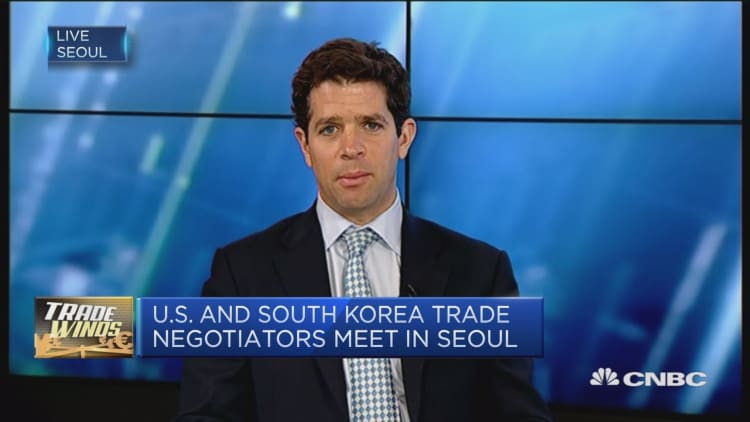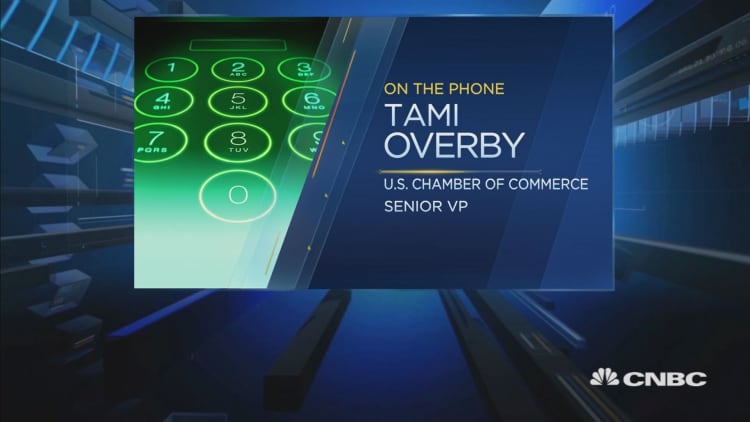The Trump administration has launched an aggressive drive to renegotiate U.S. trade deals, but one country may manage to stymie major changes: South Korea.
President Donald Trump during an April interview with the Washington Post called the U.S.-Korea Free Trade Agreement, known as Korus, a "horrible deal" that has "destroyed" his country, and he threatened to terminate it. A report in The Wall Street Journal on Saturday said the Trump administration could serve notice of withdrawal from the pact as early as next week.
U.S. Trade Representative Robert Lighthizer had sought a special meeting with South Korea on the deal in a bid to address the administration's concerns about the U.S. goods trade deficit with the North Asian country.
That meeting ended last week with the USTR issuing a statement reiterating concerns that the U.S. goods deficit with South Korea had more than doubled from the 2012 implementation of the deal through 2016.
The USTR didn't respond to CNBC's request for comment.
On the South Korean side, however, Trade Minister Kim Hyun-chong, who was the country's chief negotiator for Korus, said last week that the two sides had "different views," on both the cause of the goods deficit and whether there was a need to amend the deal.
The U.S. goods trade deficit with South Korea has certainly risen since the deal took effect. It's gone from $13.2 billion in 2011, the last full year before implementation, to $27.6 billion in 2016, according to USTR figures. But it's neither clear that Korus is to blame for that change, nor does that figure include the services component of trade, in which the U.S. has a surplus with South Korea.
Analysts pointed to several reasons the USTR might be on shaky ground when it came to trying to force through changes to the deal.

Deborah Elms, executive director at the Asian Trade Centre, pointed to one big problem with the USTR's claim that Korus was causing a goods trade deficit: The sectors that were responsible for it, which were electronics and autos.
"Korus didn't touch electronics. It didn't touch electronics because electronics were already tariff free," she said in an interview last week, noting that was due to an existing agreement with the World Trade Organization.
Additionally, "if we have a trade deficit in autos, it's really hard to blame Korus for that because the timeline for Korus hasn't done anything to autos yet," she said.
Others also noted that it would be difficult for the USTR to pin specific issues on the deal.
"The trade agreement came into effect five years ago and under normal kind of conditions you would not be making a decision at this early stage of the success of the FTA," Joshua Meltzer, senior fellow in global economy and development at think tank Brookings Institution, told CNBC's "Street Signs" last week. "A lot of the provisions are phased in over a number of years and are only coming into effect now."
Meltzer also noted that the rise in the goods trade deficit might be simply macroeconomic, with South Korea entering a recession shortly after the deal was completed in 2011.
"Korea naturally was going to be importing less than the U.S. and the U.S. was growing quite strongly and so it was sucking in more imports from Korea," he said. "It's not clear, fundamentally, what is the problem with the trade agreement and certainly what could be done to address the bilateral deficit."
Others noted that it wasn't entirely clear who was being hurt by the deal.
"Our companies tell us that it is a good deal as written," Tami Overby, the senior vice president for Asia at the U.S. Chamber of Commerce, told CNBC last week.
She noted that around 95 percent of the tariffs U.S. companies had faced on products going into South Korea had been reduced to zero, and once the deal was fully implemented, that would go to as high as 99 percent.
"Those are huge tax cuts for American companies," she said.

Overby added that terminating the deal would put U.S. firms at a "very significant disadvantage," particularly the agriculture industry, as South Korea has aggressively negotiated trade deals with competitors including the European Union, Canada, Australia, India and China.
There's another reason that it's hard to effectively blame Korus for a goods trade deficit, and it's one that's common to all trade deals: It's difficult to parse statistics to show cause and effect, Asian Trade Centre's Elms said.
As an example, she pointed to Vietnam, which saw an investment boom in anticipation of the 12-nation Trans-Pacific Partnership trade deal taking effect.
Trump had deemed the deal a "disaster," and withdrew the U.S. from the pact shortly after taking office in January. The deal had been considered all but dead until May, when the remaining 11 nations agreed to pursue a deal without the U.S.
"Vietnam is actually getting a boom, a little less now, but they were getting a boom in inbound investment ahead of TPP," Elms said, noting that when companies were interviewed, they would say it was in anticipation of the deal taking effect.
"Now we don't have TPP, have they pulled out? Most of them, no. They're still investing in Vietnam," she said, adding that such situations highlight how difficult it is to disentangle statistics on trade deals.


